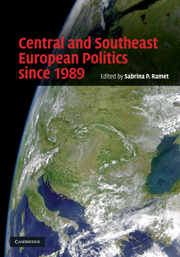Book contents
- Frontmatter
- Contents
- List of figures and maps
- List of tables
- Notes on the contributors
- Preface
- List of acronyms and abbreviations
- Guide to pronunciation of Central and Southeast European words
- 1 Central and Southeastern Europe, 1989
- 2 Central and Southeastern Europe, 2009
- Part 1 Introduction
- Part 2 Issues
- Part 3 Central Europe
- Part 4 Yugoslav Successor States
- Part 5 Southeastern Europe
- Part 6 Former Soviet republics
- Part 7 Present and future challenges
- 22 Regional security and regional relations
- 23 The EU and democratization in Central and Southeastern Europe since 1989
- 24 Facing the twenty-first century: lessons, questions, and tendencies (a conclusion)
- Index
- References
23 - The EU and democratization in Central and Southeastern Europe since 1989
Published online by Cambridge University Press: 05 June 2012
- Frontmatter
- Contents
- List of figures and maps
- List of tables
- Notes on the contributors
- Preface
- List of acronyms and abbreviations
- Guide to pronunciation of Central and Southeast European words
- 1 Central and Southeastern Europe, 1989
- 2 Central and Southeastern Europe, 2009
- Part 1 Introduction
- Part 2 Issues
- Part 3 Central Europe
- Part 4 Yugoslav Successor States
- Part 5 Southeastern Europe
- Part 6 Former Soviet republics
- Part 7 Present and future challenges
- 22 Regional security and regional relations
- 23 The EU and democratization in Central and Southeastern Europe since 1989
- 24 Facing the twenty-first century: lessons, questions, and tendencies (a conclusion)
- Index
- References
Summary
A distinctive feature of the democratic transition in Central and Southeastern Europe after 1989 has been its close link to the process of accession to the EU. There are certain similarities to the transition to democracy in Greece, Portugal, and Spain, but in these cases the EU was much less explicit and direct in its attempts to influence democratic reforms. Transition studies have been reluctant to take account of this distinctive characteristic of the process of democratization in East-Central Europe. Instead, analyses have focused predominantly on domestic factors to explain its outcome. Those transition scholars who have focused on the international dimension of democratization generally consider European integration a beneficial influence on the consolidation of democracy. However, the link between European integration and democratization is not straightforward: first, it is not clear to what extent the EU actually had a causal influence and how its influence varied across countries and issues; second, even if the EU did have a causal impact, it is not obvious that its influence was always entirely positive for democracy in ECE.
There is little doubt that the EU can exercise a tremendous influence on the domestic politics of Central and Southeastern Europe. One of the most striking examples of the EU's ability to make a government do what it would not have done otherwise – even with regard to one of the most sensitive questions of statehood – is the decision of the Montenegrin leadership to set the threshold for the success of the referendum on independence at 55 rather than 50%.
- Type
- Chapter
- Information
- Central and Southeast European Politics since 1989 , pp. 519 - 535Publisher: Cambridge University PressPrint publication year: 2010
References
- 2
- Cited by



